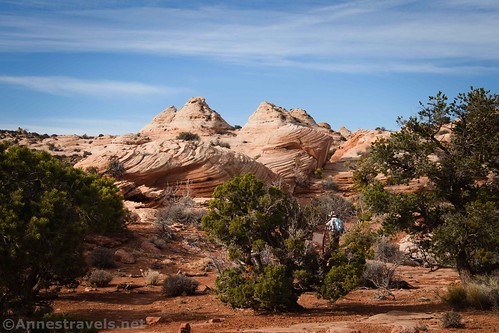
Recently, I’ve been thinking about Esau, Jacob’s older brother. We all know the story: how Esau was older, yet he sold his birthright to Jacob. How Isaac loved Esau and tried to bless him with his birthright even after it had been sold. How Rebecca loved Jacob and tricked her husband into giving Jacob the blessing.

Then Esau seems to disappear from the pages of Sunday School papers. Maybe there’s a small section given to when Jacob returns from his uncle’s household and he is afraid that Esau will attack him and his family. Esau seems to forgive Jacob and even asks him to come and live near himself. But Jacob either didn’t trust his brother or else had other reasons, because he seems to never become close (either physically or relationally) with Esau again – except that when their father died, the two brothers buried him (Genesis 27:29).

God promised Abraham the land of the Canaanites. He did not own property there (except for the cave where he buried Sarah) despite what God had sworn to him (Acts 7:5; Genesis 23:20). Isaac, similarly, did not own property in the land of promise, and neither did Jacob (who died in Egypt). But then there was Esau.

According to the Illustrated Bible Dictionary, Esau drove out the Canaanites (specifically, the Horites) that lived on Mt. Seir and settled there. Through much of the rest of the Old Testament, we see the Edomites (descendants of Esau) living in the region of Mt. Seir. In this way, Esau received the promise given to Abraham that his descendants would possess the land of the Canaanites.

It’s a strange thing: Esau forfeited his birthright and his blessing and seems to have a disregard for God and his father’s family (he married women who his parents disapproved of – a definite breach in honor back then). Yet he was the first of Abraham’s descendants to receive the promise. Jacob wouldn’t begin to receive that blessing for several generations.

When we have been waiting a long time for the promises of God to be fulfilled in our lives, it’s easy to notice others who have already received “our” promise. Someone who has been promised a baby sees a friend or family member who has been blessed with a child. A pastor who has been seeking revival sees it happening in another nation. A person who has been contending for years for the healing of a family member sees friends and even random strangers miraculously set free from sickness.

At first, it can be encouraging: God is good! He gave it to my friend, and He can do it for me! But as the years slip by, and we see more and more of our friends or acquaintances receiving the promises we desperately seek, those examples become reminders of what God hasn’t done in our lives.

The children of Israel (Jacob) could have looked at Esau’s descendants and thought, “Why am I a slave here in Egypt? God promised Abraham that his descendants would live in the land of the Canaanites. The Edomites live there. Why has it not happened for me and my family?”

But God still had a plan to fulfill the promises to the children of Israel. He was going to give the land of the Canaanites – all of the Canaanites, not just one tribe – to Abraham’s descendants. Esau might have received part of the blessing of the promise, but the Promised Land became the inheritance of Jacob.
When you’re facing the promises that haven’t yet materialized, don’t resent the people who have already received what you are believing God for. They may have received the blessing before you, but that doesn’t mean that your promise is any less on the way. God is a God of breakthrough – He will come through. God is the God of the Promise – He will surely do what He said He will do.
“being confident of this, that He who began a good work in you will carry it through to completion until the day of Christ Jesus” (Philippians 1:6).

